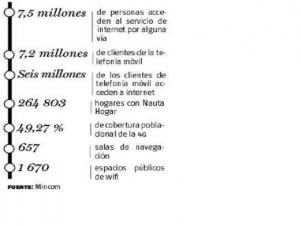
Digital transformation implies stimulating the production of information services, innovative thinking and the creation of technology-based centers with state participation, said the Cuban Minister of Communications in an interview with Granma.
While other countries computerized in 20 years, in Cuba the process took place from 2015 to 2022 under serious economic difficulties. Picture by: Ricardo López Hevia
In Cuba, the term digital transformation - in a context associated with the software industry and the intelligent, critical and responsible use of technologies - is becoming more and more frequent. But is it the same as the computerization of society, or are they antagonistic concepts?
In an exclusive interview with Granma, Mayra Arevich, Minister of Communications (Mincom), commented that digital transformation is not a new process, but a continuity of informatization.
It is, she said, "a higher stage that, using the pillars of science and innovation, will lead us to the Cuban Digital Agenda 2030, the roadmap that will allow us to project a vision of the country and make great leaps in the use of information and communications technologies (ICT)".
Now, based on what has been achieved in terms of telecommunications infrastructure, emphasis is placed on the processes that take place in the face of citizens and that contribute to a better quality of life, with the participation of all factors in the economic, political and social order of the country.
She emphasized that, as part of this strategy, preliminary ideas have been outlined in order to lead the digital transformation, and among the guiding principles are to stimulate the production of own content and computer applications and services, innovative thinking, scientific research and the creation of technology-based entities with state participation, among others.
The consolidation of this policy makes a more harmonious step towards the Digital Agenda which, due to its broad scope and in correspondence with the strategic sectors of the National Economic and Social Development Plan until 2030, has been structured in strategic axes, she said.
In this regard, she said, driving projects have been defined that will enable the necessary and available resources to be concentrated on them; to work on a full cycle; to attract talented human capital, ensuring the multiplication of results, and to identify key players and international alliances and regional integration.
For example, she explained, in Cuba several steps have already been taken with regard to the computerization of some healthcare and medical processes. The project for digital health will promote the transformation of health institutions and the achievement of an integrated service, focused on the needs of the patient and the community.
She added that all these projects will enable faster progress to be made in the fundamental issues of the economy and society.
However, she warned, digital transformation requires a profound cultural change, which starts with the very vision of how and why we use ICTs, and what to do to integrate their uses in each of the sectors of society, in such a way that this results in higher quality and safety of services. This is one of the main challenges ahead of us, she insisted.
The ICT infrastructure is the support to ensure the digital transformation of Cuban society. Its development is vital, not only to boost economic activity, but also to facilitate e-government and e-commerce, access to knowledge and increase benefits for the welfare of society, said the Minister.
In recent years, the dynamics in the development of computerization has been high. This process, which other countries promoted in 20 years, in Cuba was developed from 2015 to 2022 in difficult economic conditions, but with a government priority, she added.
That is why in this path the deployment of infrastructure was vital to ensure the development of the rest of the programs and, in this regard, she highlighted the work done by the agency in the monitoring of some projects that, even in times of pandemic, continued their development.
DURING THE COVID PANDEMIC, TRAFFIC ON THE NETWORK ALMOST QUADRUPLED
With COVID-19, network traffic multiplied almost four times, a behavior that was characterized by a movement to different parts of the cities due to the displacement of work for teleworking and home study. In this context, the Cuban Telecommunications Company made a projection to guarantee Internet access according to the demands of the economy and the population, the Minister added.
In the years of the pandemic -2020 and 2021- most of the 4G radio bases were installed in Cuba, a process that allowed having representation in all municipal and provincial capitals. At the same time, it continues to be deployed as the preferred network, although progress continues to be made in 3G technology to guarantee voice service.
The development of the country's infrastructure has also made it possible to consolidate other programs such as the Nauta Hogar service, to which 6.82% of households have access, a figure he described as "discreet", while work is being done to expand access to more families.
On the other hand, she added that the use of wifi zones in the country is maintained, not with a growth in traffic compared to other periods, but with a similar behavior; therefore, in order to achieve a greater impact on the population, they are relocated where they are most in demand.
From the beginning of the computerization program, the importance of connectivity in institutions was also taken into account, with priority given to high impact sectors such as the Ministry of Education.
The demand for services requested by the new economic actors is also guaranteed.
PROJECTIONS FOR THE SECOND SEMESTER
• Incorporating new radio bases with 4G technology to ensure user growth.
• Expanding the mobile telephony service in the 700 MHz band, which will allow expanding 4G coverage, mainly in rural areas.
• Increasing infrastructure and capacities of data centers to respond to the development and implementation of new services, the computerization process of agencies, entities and new forms of non-State management.
• Digitalization of national contents.
• Improvement of electronic transactions that support electronic commerce.





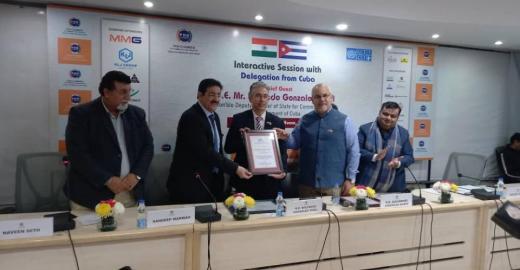

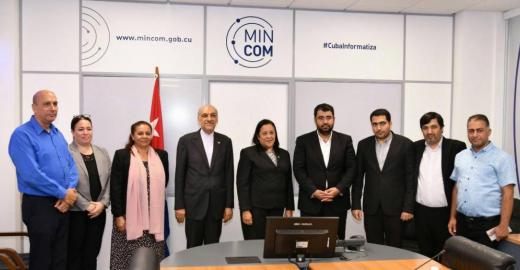





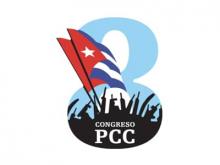
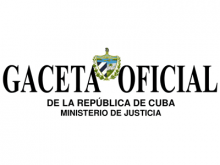

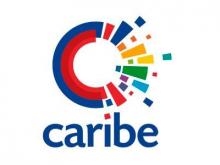
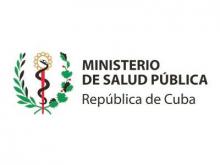



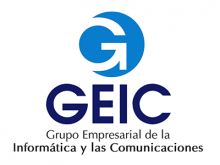
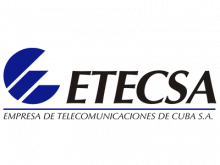
Publicar nuevo comentario